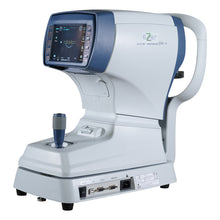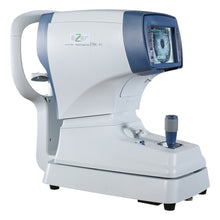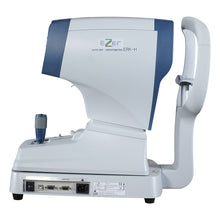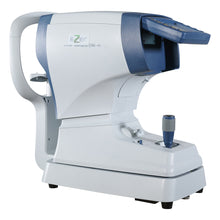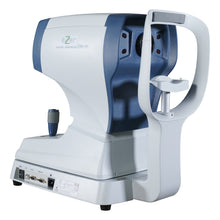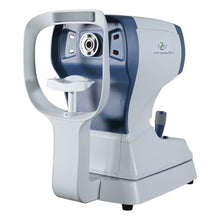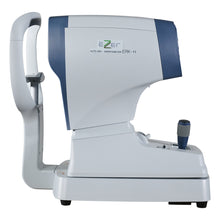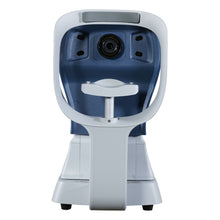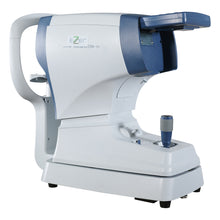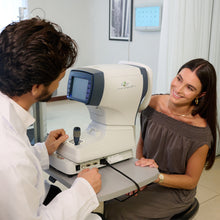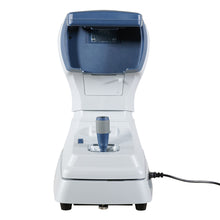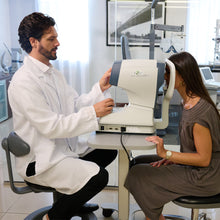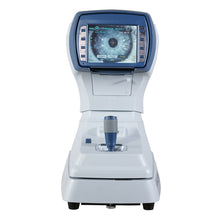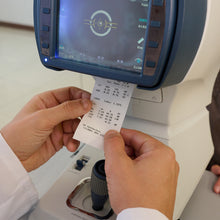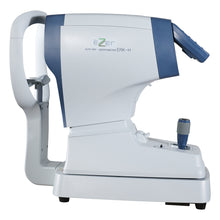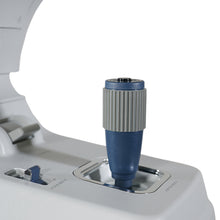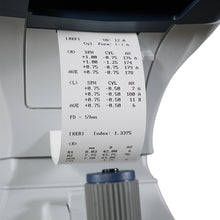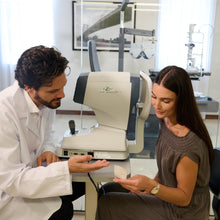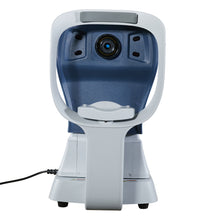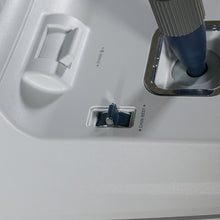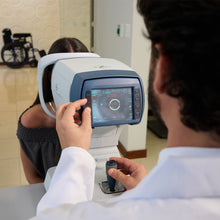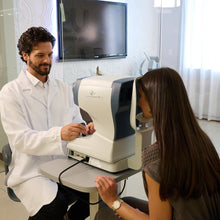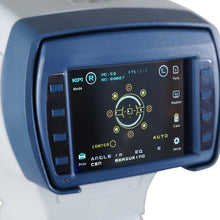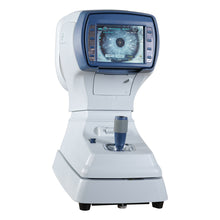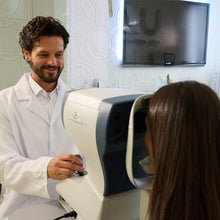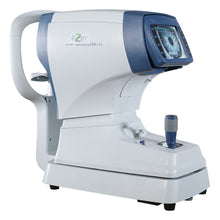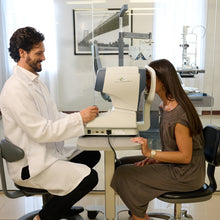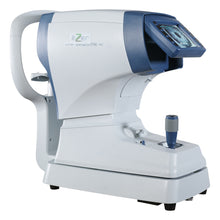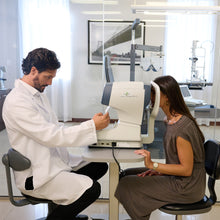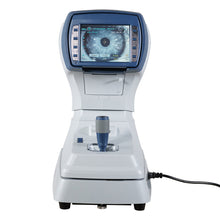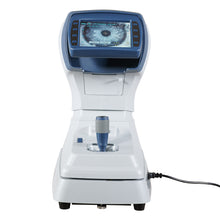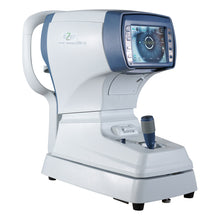Ezer Autorefractor / Keratometer ERK-H
Precision optics and intuitive operation come together in the Ezer ERK-H, the ideal automatic refractor + keratometer combination unit for ophthalmologists who refuse to compromise between features and comfort. The Ezer ERK-H saves clinicians time and effort, so that they can provide exceptional patient care without any instrument issues. This excellent and professional choice guarantees accuracy and convenience when taking optometric measurements.

Peripheral Keratometry
Peripheral corneal curvatures can be measured by having the examinee look at the peripheral eye fixation lamps. Measuring the corneal periphery helps examine irregular astigmatisms, and also helps determine a better fitting for a contact lens.

Refractometry & Keratometry Measurement
The ERK-H has an impressive dioptric measurement range (-25D to +22D), allowing for accurate measurements on patients with extreme myopia. Quick peripheral corneal curvature measurements can be taken by having the patient direct their gaze to the peripheral eye fixation lamps. The ERK-H takes readings across a high curvature radius range (5.0 mm to 10.2 mm), providing the measurements needed for eyeglasses or contacts for most patients.

Intuitive Diameter Measurement
The built-in software of the ERK-H enables easy diameter measurements using the freeze mode, where measurements of the diameter of the cornea, pupil or hard contact lenses worn by the patient can be taken. By simply touching and dragging the screen with your finger, these measurements are calculated exactly.
IOL Measurement
When refraction results in an error reading due to an intraocular lens or cataract, the measurement can be performed with the IOL icon switched 'ON' to obtain results.

Convenient Control by TFT-LCD Touch Screen
At the core of the ERK-H’s user experience is its 5.7 inch VGA TFT-LCD touch screen, making the testing experience is painless for both the user and the patient. Tap the icon and change settings on the fly without having to deal with cumbersome menus.

Tilt LCD
To prevent neck and back strain during regular daily use, the screen can tilt up to 90° so the user can simply look down instead of leaning over.

Instant Display Data

The data from the ten most recent exams can be uploaded with the touch of a button, and a built-in auto-cut printer allows users make print records during the examination. Data can easily be transferred using a USB or RS-232 cable.


Interactive SETUP Change
Simply touch the icon on the screen to see any changed settings. The touch screen supports interactive setting changes quickly and conveniently to save the user precious time.

Assistant Measurement Function
ERK-H provides the assistant measurement function for eyes that have different measurements between the center of miring and the center of REF focus.

Guidance Function for Measuring
ERK-H indicates the direction of movement and conditions needed to focusing the center of the measuring eye for increased convenience.

Motorized Chinrest
The motorized chinrest, conveniently located below the touchscreen, can be lowered or raised effortlessly to reach a comfortable height for each patient. Once at the right height, alignment can be set with the smooth sweeping action of the joystick. Then, with a single tap on the screen or press of the measurement button on the joystick, the Ezer ERK-H can perform refraction and keratometry back-to-back.
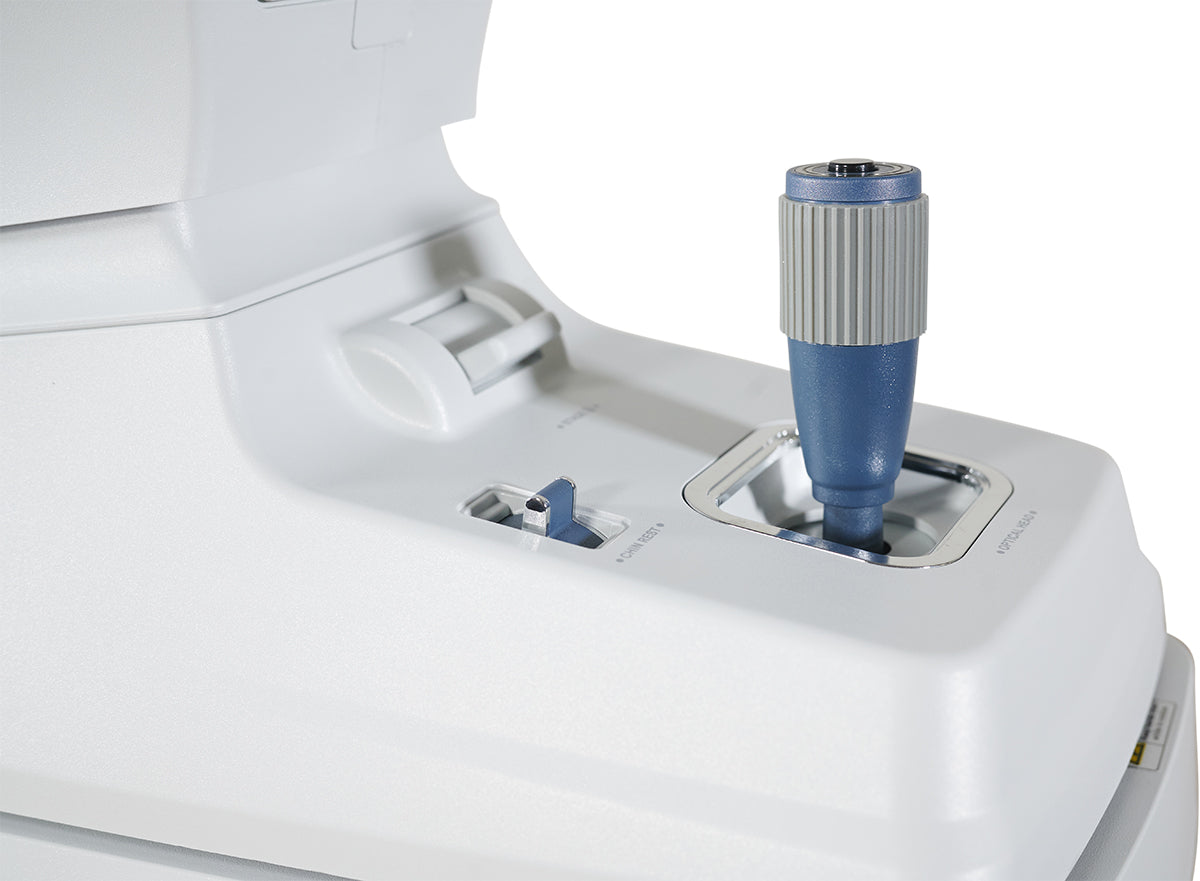
Stage-Lock
The main body of the machine can easily be fixed to the base with the convenient one-touch lock.

Printer with Auto Cutter Function
The ERK-H provides an immediate and complete printout of measurement results and an auto printer cutter is included for extra convenience. An economy printer mode can be used to save printer paper by displaying results in a more compact manner and amending the letter size.

Compatible Connection to Various Systems
The ERK-H can connect to several other digital ophthalmic instruments by Ezer to serve as the hub of the digitally-enabled exam room. Data can be entered or transferred directly from compatible devices, and the control box can operate many of the different functions of each device.
DIGITAL CLINIC

What is an EMR?
Electronic Medical Records, commonly abbreviated as “EMR”, are a technological tool used widely in modern medical practices. EMR systems were designed to replace outdated paper charting methods and streamline the collection and tracking of patient data over time. EMR platforms integrate the various components of a doctor’s office visit, including intake demographics and medical history, prescription information, laboratory data, practice management software, exam notes, and more.
Overall, EMR systems are used to promote economic efficiency and improved patient care through a seamless coordination of data collection and storage. EMR platforms also increase patient transparency through use of portals where patients can view important results and communicate with Doctor’s in a secure manner.

In the Ophthalmic industry, EMR are becoming more important and popular than ever. The ability to save critical lab data relating to prescriptions and diagnoses while maintaining quick access to that information is key in decreasing chair time and improving patient outcomes and satisfaction.
With the Ezer Digital Practice, information sharing is easier than ever! The ELM-BH Lensometer, ERK-H/BH Autorefractor, EDR-H Phoropter, and EDC-BH Visual Acuity Chart all interact via Wifi to streamline communication between your pretest and exam rooms.
We know it can be scary to introduce a new technology to your practice, but with the Ezer Digital Practice equipment and US Ophthalmic’s superior tech support, your practice will save time and money with a seamless EMR integration.
| Our EMR Partners |

|

|

Click here to see the brochure

Click here to see the manual
| MEASUREMENT MODES | |
| K/R Mode | Continuous Keratometry and Refractometry |
| REF Mode | Refractometry |
| KER Mode | Keratometry |
| CLBC Mode | Contact Lens Base Curve Measurement |
| K(P) Mode | Peripheral Keratometry |
| REFRACTOMETRY | |
| Vertex Distance(VD) | 0.0/12.0/13.5/15.0 |
| Sphere(SPH) | -25.00 ~ +22.00D (when VD=12mm) (Increments : 0.12 and 0.25D) |
| Cylinder(CYL) | 0.00 ~ ±10.00D (Increments : 0.12 and 0.25D) |
| Axis(AX) | 1 ~ 180° (Increments : 1°) |
| Cylinder Form | -,+,MIX |
| Pupil Distance(PD) | 0.4 ~ 3.5in (10 ~ 88mm) |
| Minimum Pupil Diameter | Ø0.08in (Ø2.0mm) |
| KERATOMETRY | |
| Radius of Curvature | 0.2 ~ 0.4in (Increments : 0.0004in) (5.0 ~ 10.2mm (Increments : 0.01mm)) |
| Corneal Power | 33.00 ~ 67.50D (when cornea equivalent refractive index is 1.3375) (Increments : 0.05/0.12/0.25D) |
| Corneal Astigmatism | 0.00 ~ -15.00D (Increments : 0.05/0.12/0.25D) |
| Axis | 1 ~ 180° (Increments : 1°) |
| OTHERS | |
| Corneal Diameter | 0.08 ~ 0.55in (Increments : 0.0004in) (2.0 ~ 14.0mm (Increments : 0.1mm)) |
| Memory of Data | 10 measurements for each eye |
| Internal Printer | Thermal line printer with Auto - Cutter function |
| Monitor | 5.7 inch (1448 mm()) TFT-LCD (640 × 480 pixels, Touch-Screen function) |
| Power supply | AC100-240V, 50/60Hz (Free Voltage, Free Frequency) |
| Dimensions | Approx. 10.23(W) × 20(D) × 17.8(H)in (Approx. 260(W) × 500(D) × 450(H)mm) |
| Weight | Approx. 44lb (Approx. 20kg) |
| MEASUREMENT MODES | |
| K/R Mode | Continuous Keratometry and Refractometry |
| REF Mode | Refractometry |
| KER Mode | Keratometry |
| CLBC Mode | Contact Lens Base Curve Measurement |
| K(P) Mode | Peripheral Keratometry |
| REFRACTOMETRY | |
| Vertex Distance(VD) | 0.0/12.0/13.5/15.0 |
| Sphere(SPH) | -25.00 ~ +22.00D (when VD=12mm) (Increments : 0.12 and 0.25D) |
| Cylinder(CYL) | 0.00 ~ ±10.00D (Increments : 0.12 and 0.25D) |
| Axis(AX) | 1 ~ 180° (Increments : 1°) |
| Cylinder Form | -,+,MIX |
| Pupil Distance(PD) | 0.4 ~ 3.5in (10 ~ 88mm) |
| Minimum Pupil Diameter | Ø0.08in (Ø2.0mm) |
| KERATOMETRY | |
| Radius of Curvature | 0.2 ~ 0.4in (Increments : 0.0004in) (5.0 ~ 10.2mm (Increments : 0.01mm)) |
| Corneal Power | 33.00 ~ 67.50D (when cornea equivalent refractive index is 1.3375) (Increments : 0.05/0.12/0.25D) |
| Corneal Astigmatism | 0.00 ~ -15.00D (Increments : 0.05/0.12/0.25D) |
| Axis | 1 ~ 180° (Increments : 1°) |
| OTHERS | |
| Corneal Diameter | 0.08 ~ 0.55in (Increments : 0.0004in) (2.0 ~ 14.0mm (Increments : 0.1mm)) |
| Memory of Data | 10 measurements for each eye |
| Internal Printer | Thermal line printer with Auto - Cutter function |
| Monitor | 5.7 inch (1448 mm()) TFT-LCD (640 × 480 pixels, Touch-Screen function) |
| Power supply | AC100-240V, 50/60Hz (Free Voltage, Free Frequency) |
| Dimensions | Approx. 10.23(W) × 20(D) × 17.8(H)in (Approx. 260(W) × 500(D) × 450(H)mm) |
| Weight | Approx. 44lb (Approx. 20kg) |





































